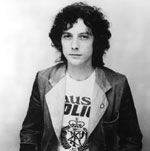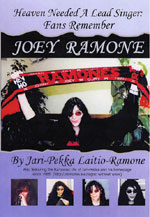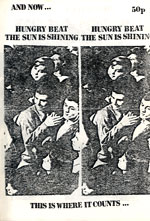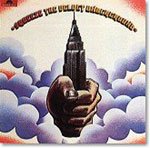Not Your Uncle Lou's VU
| |

| February, Year Three: glorified karaoke singers, flesh peddlers and charlatans unconnected to Tim Burgess hog the pop charts. Space shuttles fall like molten supernovas from the skies above Texas. First Pete Townshend busted, then Phil Spector, who wasted no time getting one of OJ Simpson's lawyers to defend him (and who will be contracted to put a hardboiled-lit. spin on his trial? James Ellroy? Nah, he hates rock and roll. Nick Tosches, maybe?). Saber-rattling from our supposed leaders so loud it may as well be put through Marshall amps. For some of us, it's not a good time, but you gotta get used to and resign yourself, you get what you...deserve? Surely you jest, Mr. Chilton. There is definitely dread in the air, a dull throb of a feeling like God's away on more urgent business than assisting in the meager existences of fools like myself. Of course, my attitude towards the current state of the world is not improved by the dayjob I am currently trapped in, that of market research; a profession that I can now confidently declare - having spent considerable time at it - is one recommended only to the deeply masochistic, verbally incontinent or thoroughly desperate. (And to answer your question, less so with each passing day on the first two counts, increasingly more so on the third.) Nor is it helped by my living in a part of town chiefly known for its vibrant Latino community, yet unfortunately also for its substantial contingent of night blooming street trash. Visible reminders of the failure of both the American mental health system and drug policies, these are people that in the context of, say, a Richard Pryor routine are hilarious, or even romantic in a grubby sort of way in a Mark Eitzel song, but downright pitiful to have to deal with in real life. Worse, the ones that aren't merely pitiful are, if not potentially dangerous, downright annoying. Hanging on the corner in their bootleg designer sports clobber, blaring boomboxes at all hours, trading in all manner of illegal contraband, I sit at my window and wish slow and painful doom on them all. Yes, I am Travis Bickle. (And speaking of urban debris, how about this rapper protégé of Eminem's called 50 Cent, huh? Not long ago I read a profile of Mr. Cent in Rolling Stone - while on the supermarket checkout line, natch - that makes zero value judgments as he openly brags about how this rap thing is just a sideline to his main gig as a crack dealer, and how he's been shot multiple times as a result of said vocation. It all called to mind a certain word beginning with the letter N: Neanderthal.) |

| So I do what I can to dispel the dark mental clouds, which mostly involves listening to music, as one does, but also by doing something nearly as enjoyable, namely reading about music. As a child of under-the-counter-culture as once documented by Creem, Sniffin' Glue and Zigzag, most of your glossy music zines hold little to no appeal. Having said that, I do have a soft spot for your Mojos, Uncuts and Wires, if for nothing else their eagerness to include complimentary CD's; as a committed cover-mounted disc ho, I appreciate their more often than not delivering the high quality, ear-opening goods. Mostly though, I put major faith in those mags, both hardcopy and online (like the one you're reading now), that convey enthusiasm for their subject, along with a damn good literary voice that makes you look at/listen to something in a new way, or more useful, a way you could perhaps not previously articulate. Recently, the inimitable Rockin' Bob Stanley had a piece in The Independent paying tribute to fan-driven, fanclub-aligned periodicals like the newly defunct Beatles Monthly. Another thread of music journalism that's, to be sure, maybe more obsessive and extreme than most, but one worth admiring for being motivated more by personal passion than ad sales. Two recent books that have crossed my path couldn't be better examples of this: Allan Metz's Blondie: From Punk To The Present - A Pictorial History (Musical Legacy Publications, US) is, at 500+ pages, surely the most exhaustively thorough history of Mme. Harry and company to be published yet. Better still, that is was done by and for fans provides a perspective heretofore missing in both the ´insider' accounts (the recent Gary Valentine memoir; Harry/Stein/Bockris' Making Tracks) and Lester Bangs' cash-in bio, each of which came with their own inherent agendas. Choc-a-block with personal fan discographies and retrospectives; interviews and articles from a wide array of sources covering Blondie's entire history, up to and including the arguably successful reconvening, No Exit; many, many unseen photos; even some pieces that push the limits of fandom (a physician's report following the changes in Clem Burke's heart rate over the course of a recent concert?!). Truly a Blondie trainspotter's bonanza. Heaven Needed A Lead Singer: Fans Remember Joey Ramone (TMI Ramoniac, Finland) is a similar labor of love from a Finnish chap who operates one of the more substantial online Ramones websites. While not as maddeningly comprehensive as the Metz book, its countless testimonials from fans and fellow musicians alike, along with its own cache of rare photos, make for a good old fashioned memory-jog. If nothing else, it's a fitting accompaniment to the recent rash of Ramones CD reissues. (Personal favorite: Pleasant Dreams, the 1980 LP that united the Brudders' conflicting pop and punk impulses to stunning effect, thanks no doubt to the assistance of folks like 10cc's Graham Gouldman and Sparks' Russ Mael. Some fine added outtakes, too.) |

| Another thread of print coverage covered in Bob's Independent piece was the resurgence of zines in the UK during the 80's. Among those mentioned was, as you might imagine, Kevin Pearce and his Hungry Beat, which got me thinking about how much I miss his occasional appearances on this very site. One of my favorite pieces was ostensibly an appraisal of the fantastic Velvet Underground Quine Tapes box; mainly, though, it was Pearce's memories of being a Velvet Underground obsessive, a pursuit I certainly could and can relate to. It's something I thought about a lot while giving a listen to another recently issued VU box set, this courtesy of the wonderful Captain Trip label from Japan, Final VU:1971-73. This is a four-CD set of previously unreleased live recordings chronicling a lesser known, much reviled period of the Velvets, the post-Lou, post-Sterling edition fronted by Doug Yule. Thus we open an old and moldering can of worms. Doug Yule, pah; pretender, opportunist, nowhere near striking distance of the monumental talents of Uncle Lou, I hear you say. Didn't Lou in fact throw down a rather caustic putdown of Yule during a famous, widely booted 1972 live US radio broadcast (now commercially available as a CD called American Poet)? And what Fall fan can forget Mark E. Smith, on the song 'Shoulder Pads', dispatching a weekend hipster with the accusation that "he couldn't tell Lou Reed from Doug Yule"? Well, maybe with the release of Final VU it's time to give the old devil partial due Yes of course, sans the contributions of Reed and Morrison - while still at first retaining the eternally sensible Mo Tucker backbeat - what was then derided as ´the Velveteens' from the get-go had no hope of having as cataclysmic an impact as it did originally. However, once the listener lets go of such expectations, he finds in its place, as evidenced in these live tapes, a perfectly serviceable, rock and roll dance band (in its way as much so as the VU of the Quine Tapes/Live '69 era) doing its best to extend due tribute to its past, while simultaneously trying to plot out some semblance of a future. Also of note about the Velveteens was how at this juncture they almost imperceptibly became as much a Boston band as a New York band. Not only was Yule from there, but certainly by then they had almost more of a fanbase in the Boston area than anywhere else, including NYC. The Beantown connection became further explicit with Yule's bringing on board other local musicians, the best known of which was surely one Willie Alexander. As much a venerable part of Boston rock history as the likes of Jonathan Richman, John (Real Kids) Felice and Jeff (DMZ/Lyres) Connolly, Lowell, Mass. native Alexander was and is a true artistic bohemian, coming on with a head poetically twisted by fellow Lowell homeboy Kerouac (also the subject of one of his greatest songs), hands possessed with the twin piano-playing spirits of JS Bach and Johnnie Johnson, and an insinuating rasp of a voice given to occasional fits of gargled ululation. He was the secret weapon of the early post-Lou VU, and adds much gritty esprit to the performances on the first two CD's of this set, from London and Copenhagen in 1971. While it's unfortunate to consider that this was the only edition of the VU to actually make it across the Atlantic, the Velveteens manage to hold their own quite respectably, to the obvious enjoyment of those assembled. All the appropriate touchstones are fondled and occasionally roughed up - of special note are the versions of 'Some Kinda Love' and 'Sister Ray', complete with a spooky piano intro from Alexander. Even Yule originals like 'Dopey Joe' which eventually found their way onto the infamous Squeeze lp aren't quite so terrible. All this, and then the intermittent moments of light relief, like the accapella 'Chapel of Love' opening the London set (with Yule's comment: "Just to show you we can sing..."), or Moe's shaky yet always rapturously received warble of 'Afterhours'. |

| By 1972, Yule was pretty much the sole link to the past, having drafted in a whole new band of Boston locals to tread the UK boards. Disc 3, live at a college in Wales that December, presents a version of the Velveteens that comes closest to the Live '69 VU than those previous, as it reverts to the two-guitars-bass-drums lineup of that band. Sparks do fly throughout on chestnuts like a feedback-drenched 'Run Run Run' and newer Yule tunes like the Whoish 'Little Jack' alike, and judging from the enthusiastic (or, seeing as it was a college crowd, perhaps booze-aided) response they receive one can perhaps conceive this version of the band could have gone somewhere. Of course, this was not to be, and Yule limped into 1973 finally fronting a band under his own name; one final indignity presented itself, however, in the form of an unscrupulous concert promoter's booking a set of New England club dates for Yule and cohorts, only to discover said promoter had booked them as - you guessed it - the Velvet Underground. The final CD documents one of these shows, and it's clear that the good was well and truly gone by this point; as a friend remarked, you can almost hear the beards and denim this band no doubt sported, as they ramble thru a set of sub-Grateful Dead mellow maunderings like 'Let it Shine', as well as the occasional perfunctory VU cover. All told though, Final VU is a long overdue fleshing out of a chapter of the Velvets that one could only previously speculate about - for better or worse, one that makes for fascinating listening above and beyond the mere history lesson. Incidentally, the folks responsible at Captain Trip - whose catalog is also distributed by Forced Exposure in the States - have done much to have me jumping up and down lately. I have always had a soft spot for the glam/pop vaudevillean career of Andy Ellison; starting with John's Children in the 60's, later joining forces with bassist/songwriter Martin Gordon - a main architect of the Gilbert-and-Sullivan-with-loud-guitars sound that earned the Mael brothers of Sparks their first UK hits - in bands like Jet and Radio Stars. Occasionally over the years, Ellison and Gordon have reconvened for tours, and one during 2000 was recorded and released by Captain Trip, as Music For The Herd Of Herring. On it they're joined by erstwhile Morrissey collaborator Boz Boorer, and together they power through some delightful, high-humoured versions of classics by each of the above bands, even throwing in the odd Sparks b-side. Then for you diehard fans of 70's British rock marginalia, there's Captain Trip's offering up of the final live recording from 1978 of the Doctors Of Madness, one of those bands that were caught in the artistic mung between art-rock and punk but gave both styles their best, most coordinate shot. Hell, they even got Dave Vanian to join up as frontman when the Damned was temporarily languishing. Well, since this is not Vanity Fair, however fortunately, and neither am I Dominick Dunne - though we do share similar tastes in eyewear - I will conclude this insufferable Trans-Atlantic ramble by hipping you and yours to one final disc. Do You Party? by The Soft Pink Truth (Accidental) is the latest solo project of Drew Daniel, one half of electronic duo Matmos, most infamous for their work both with Bjork and for constructing music from sampling the sounds of devices used for cosmetic surgery. This is a fantastic piece of work that make you dance and think, and one that will also appeal to those entranced by the work of correspondingly sample-mad folks like Boards of Canada. I will no doubt elaborate on this in future, but suffice to say all hail Drew Daniel and his sinuously syncopated soundscapes. To paraphrase an old Mark P. review, this is a CD that makes me think of Art, body-popping and freezer burn - very good indeed. A far more learned gentleman than myself once said that if we all got what we deserved, we would starve. But as music is and will be for the foreseeable future the food of love, than having a full plate at all times, and especially now, is surely one thing sentient beings justly have coming. Who's for rolling up and chowing down right now, then? © 2003 Michael Layne Heath |